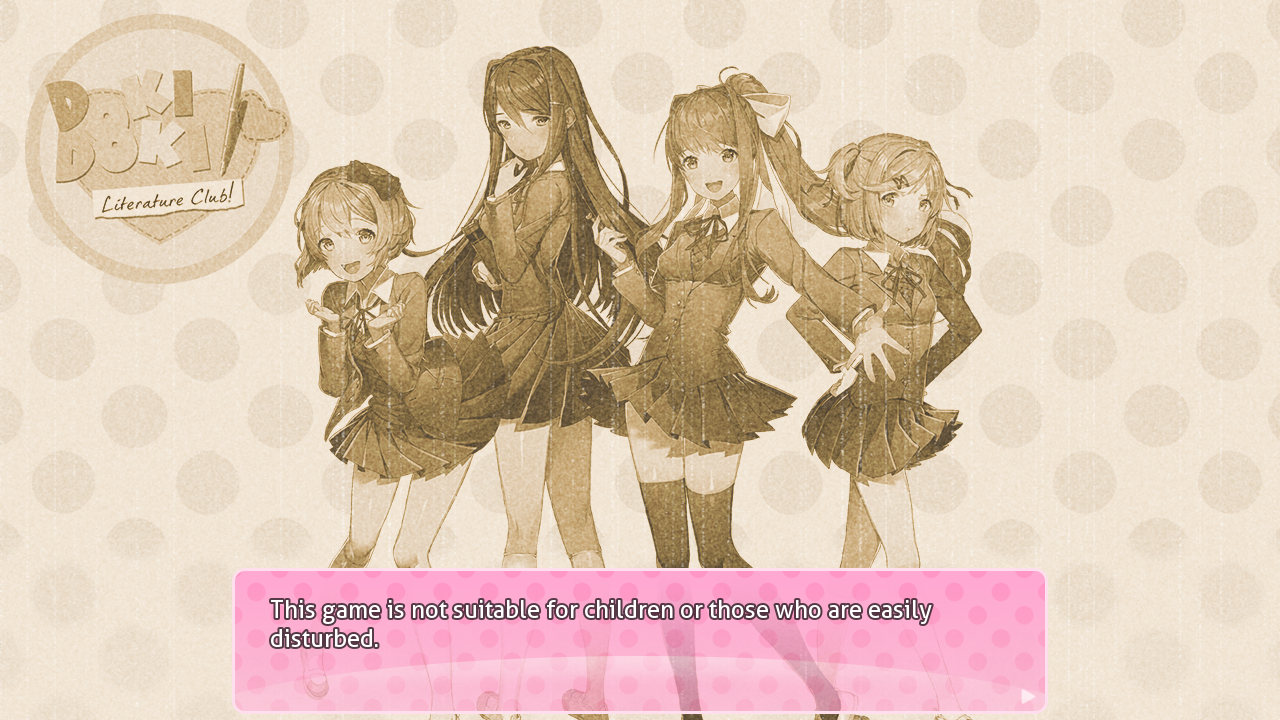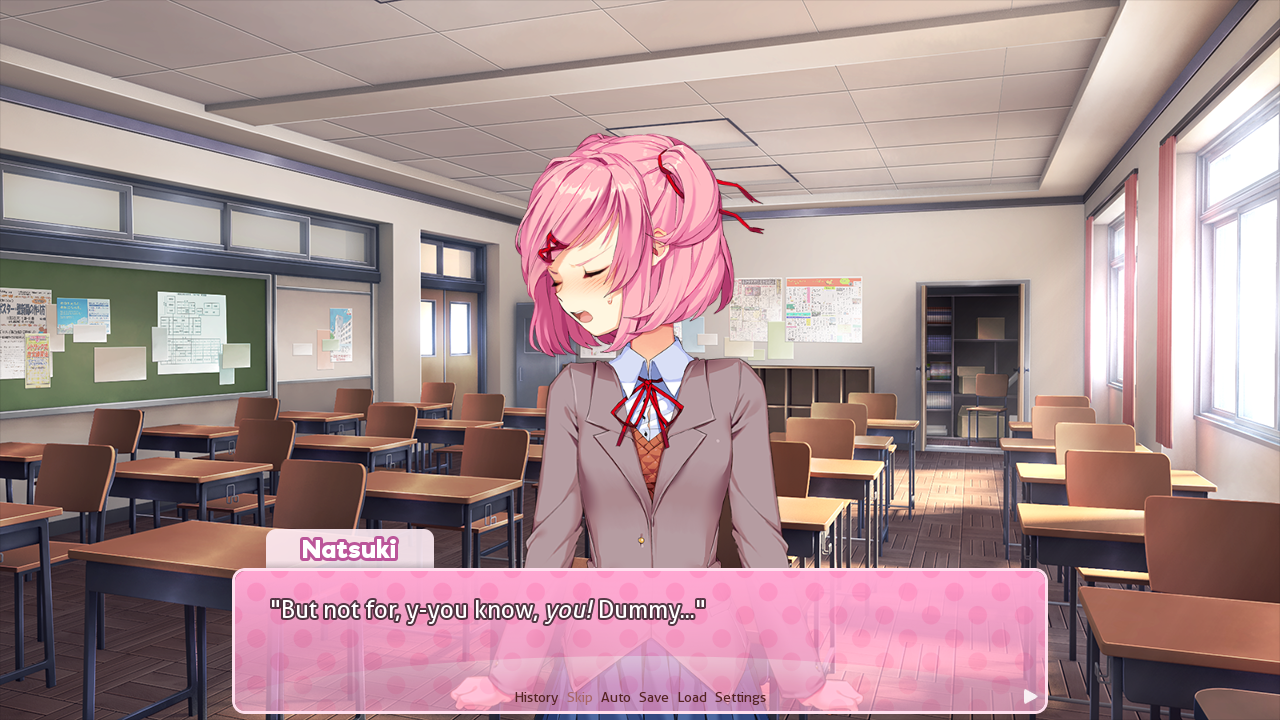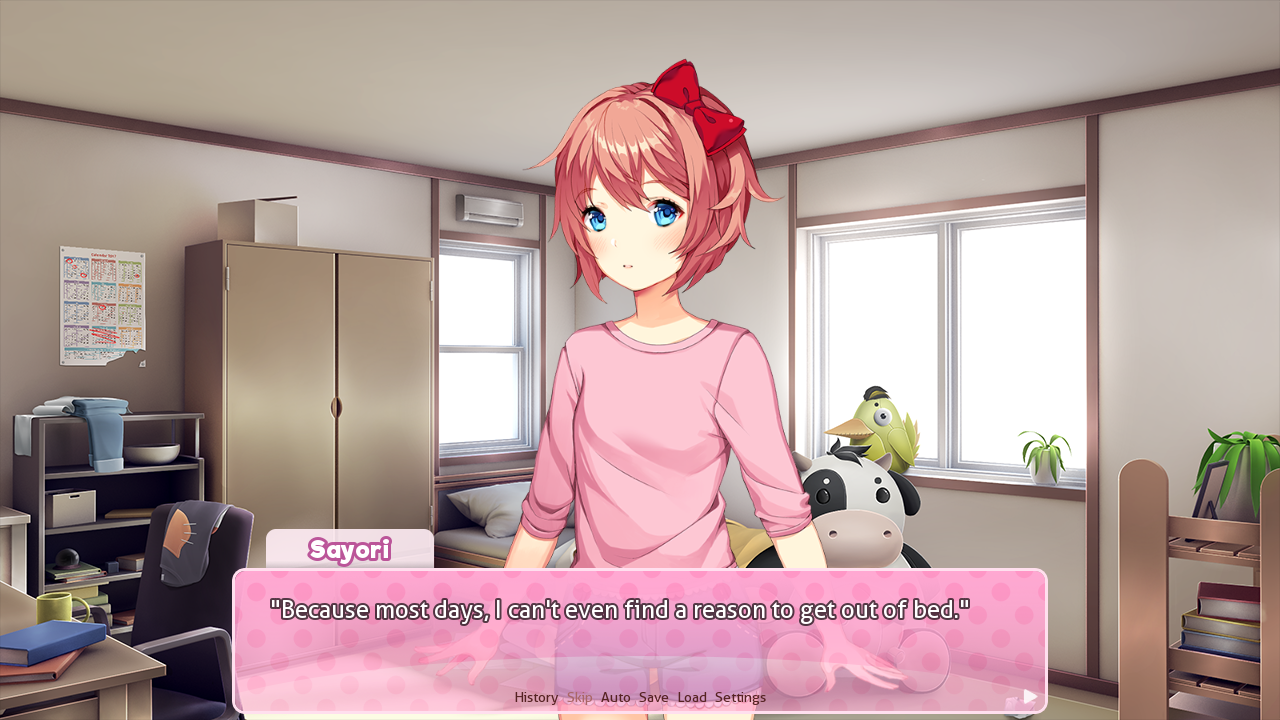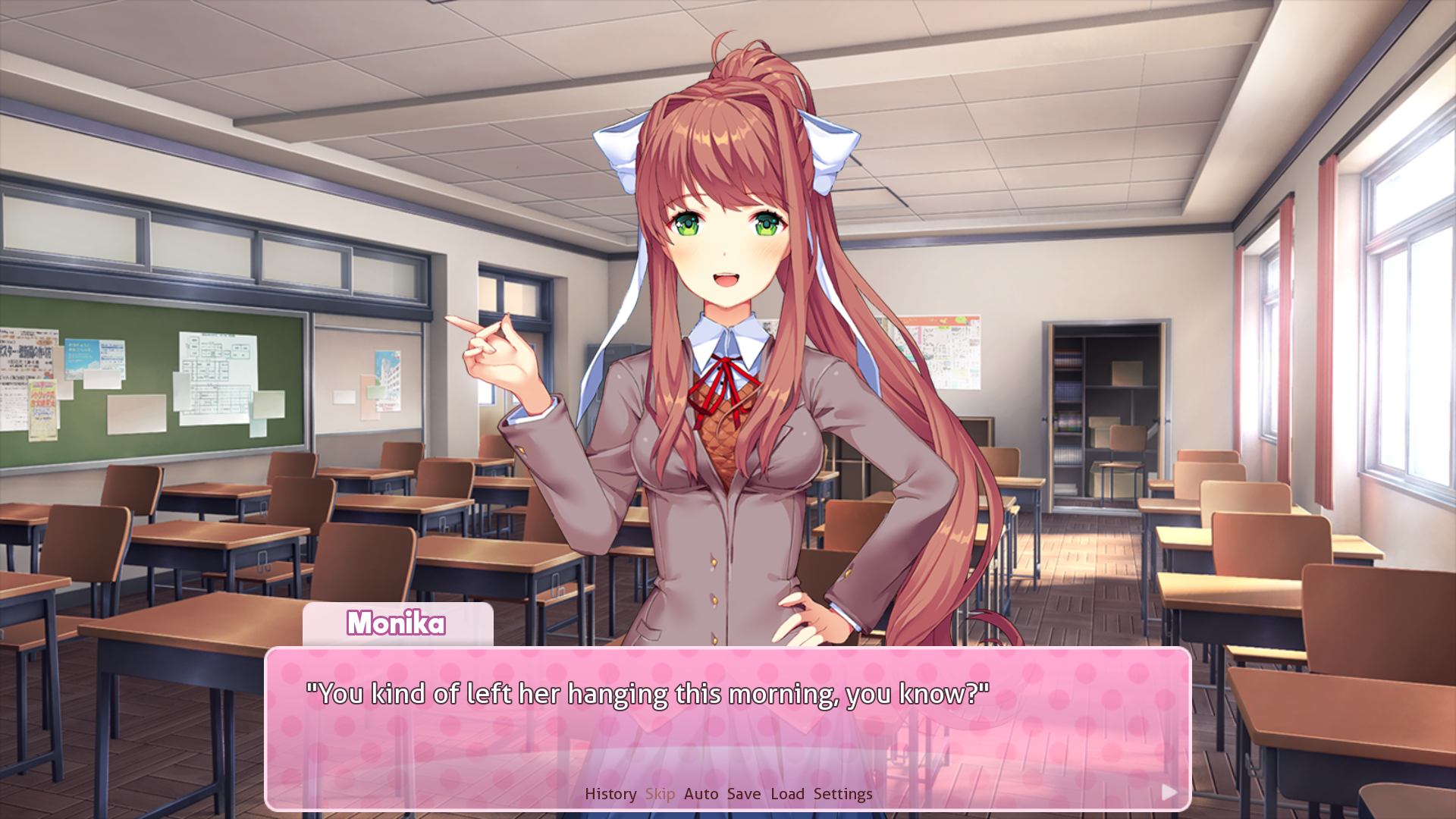Scotty Plays Doki Doki Literature Club! Subversion and Disaster
/Last week I tweeted about a game I finished that really rattled me. It's the first game I've played in a while that's truly gotten into my head. It started off with a recommendation from my cousin, which is how I want to start this post; Don't Wikipedia it. Don't Youtube it. Don't be fooled by it. Just download it (it's free) and play it. Trust me. But before you do, take heed:
All imagery in this post is taken from Doki Doki Literature Club! which is the property of Team Salvato © 2017. Please support the official release.
This trigger warning is 100% serious. It extends to this post with the addition of a spoiler warning. In case you have a tall monitor, here are some pictures from the game that will block out any spoilers written below:
Okay, we're good? If you scrolled to this point I'm going to assume you're either not going to play this game or don't like suspense.
So yeah, the only reason I even picked up Doki Doki is because my cousin requested ninety minutes of my time. "Just give it an hour and a half and you'll either be hooked or you can give it up. I just want to see what you think."
I went to the Steam page and what immediately caught my attention was the game tag "Psychological Horror." Despite it being a small spoiler, my attention immediate turned to interest. Doki Doki presents itself as a typical dating simulator, complete with overly cutesy visuals, cheery music and skirts that behave like they're caught in a perpetual windstorm. If Google is anything to go by "doki doki" refers to the sound of an increasing heartbeat, commonly used in the context of emotional or sexual arousal, stage fright or other strong emotions.
Including fear.
So I've only ever played one dating sim before, courtesy of the same cousin, and it certainly left an impression on me (the story of which will be told another time). The experience taught me enough about the genre to catch on to all the typical tropes Doki Doki began to exploit. It wasn't long before I'd been introduced to all the typical personality (and body) types; you have Yuri, the shy, sexually repressed intellectual; Natsuki, the suspiciously young-looking yet aggressively assertive one; Sayori, the manic pixie girl who's been your friend since childhood;and Monika, the mature, over-achieving club president.
Once the roster is established, it's up to the player who they want to creep on. It's a dating sim right? So they're no matter who you pick they're destined to fall in love with you right? Sure. So along I went, laughing at the tropes but getting into the relationships regardless. If this game is worth a recommendation, there's no harm in a little enthusiasm.
My goal was to be as neutral as possible because I didn't want to be a pervert. It became pretty obvious that the childhood friend held substantial unrequited love for the player and she seemed like the safest option to go for. Especially since dating one of the other girls might land you a some kind of watch list...
The first hour of play is more or less what I expected. Each character gets their share of exposure with enough tantalising hints of personal baggage to leave the player wanting to know more. A lot of this manifests in the poetry, which I must say from an amateur's point of view was actually pretty good; with each girl creating imagery with either morbid, melancholy, lonely or abstract overtones.
The implications don't take long to develop into proper dialogue. While hanging out with the neighbour, she reveals she has had severe depression for most of her life. It's also clear that she is terrified by the possibility that you, the player, don't feel as strongly about her as she does about you.
It's okay Sayori! Scotty to the rescue! At this point I figured I'd roll with this plot thread and confess my undying love for her. We can get through this together. It'll be some cute Taylor Swift girl-next-door s***.
On a serious note, the dialogue is well written and the interaction feels insightful, helpless and awkward. It's one of the best depictions of depression I've seen in a game and a lot of the subtleties in Sayori's behaviour click into place. Despite opening up about their feelings for one another, both Sayori and the player character are left uncertain about the future. It's authentic in how dissatisfying the conversation feels. You may have just had a powerful emotional moment with her but that doesn't cure her of her crippling mental disorder.
The next in-game day is when Doki Doki reveals its true nature. First of all, you're greeted by Monika who assaults the player character with intimate knowledge of their interactions with Sayori; a conversation that I thought would have been kept very private.
Then comes Sayori's 'poem' for the upcoming festival...
As soon as this appeared on-screen a physical shiver ran down my spine. Immediately warning bells went off in my head and I was relieved that the immediate reaction available was to rush back home to check on Sayori. She's not answering her phone, she doesn't answer the door. And even though I knew what was coming, I wasn't prepared for it...
Scotty.
Scotty. Scotty. Scotty.
Steam told you this was going to happen. No game has "Psychological Horror" as its first tag and doesn't include inevitable trauma.
Jeepers... It sounds weird to say but everything about the scene is really well done. I still have the imagery burned onto the back of my brain. The fact that I can only vaguely replay the music in my head is a small mercy. The whole experience is utterly harrowing. I was left feeling helpless and sickened while my character is left a blubbering mess. And then it ends. Game over. Done. Thank you for playing.
...wut...
The title screen reloads and I'm welcomed with this:
Notice how "Load Game" is faded? The bloody game deleted my save files! There's no going back and seeing if I could have done anything to save Sayori. And looking at the title screen it seems the game wants me know it.
Oh s*** boi round two here we go!
It's no surprise that my second run through is plagued with "glitches." Any mention of Sayori's presence is hastily replaced with alternative text and broken images. Monika takes up her position in the plot which, for the most part, tries to carry on as normal. Except this time everything is a little off. Not just with the glitches but more subtle things too.
The dialogue feels a lot more raw the second time round. Natsuki's assertiveness becomes more aggressive and spiteful. Yuri's shyness becomes more eerie and obsessive. The only one who seems relatively unaffected is Monika. If Sayori's poem hadn't already raised suspicions about her, it was this moment which I began to speculate that Monika was actually manipul... wait a minute...
I want to avoid simply retelling my experience of Doki Doki and actually bite into the meat of the game and why it's so good. As a final remark on the plot; it does not pull it's punches, I assure you. This game f***ed me up.
Having noted Doki Doki was a horror game when I first downloaded it, combined with the added warning at the beginning, it was no surprise that the game took a disastrous turn in content. The glory of psychological horror is that it gets under your skin. It's the subversion of expectations and the breaking of mental shields that messes with you. It's the ghost hiding under the bedsheets with you; it's the call that's coming from inside the house; it's the reflection that blinks when you don't. Doki Doki takes advantage of the player's expectations on two levels, the first being the simple "Hurr hurr. Doki Doki is a totes kawaii dating simulator. Come hang out with cute girls. BAM! Teen suicide." The second is the Doki Doki run by Monika. She knows you know it's all a game. She knows you're going to try and save scum your way through. She knows when your sleeping. She knows when you're awake. She knows if you've been bad or good so be good for Yuri's sake.
Monika's character becomes this insidious figure behind a front of normality. While the other two characters fall victim to the developing horror of the second playthrough, Monika is dismissive that anything is wrong. Each of her lines feel like they're delivered to both the player character and the player themself.
"I'm glad to see you didn't run away on us."
"I think you saw something earlier you weren't supposed to see."
I only noticed later that Monika is the only character who faces the screen directly. Almost as if she's talking to you.
One of the big subversions Doki Doki performs on the digital novel genre is how little agency the player actually has. Typically the player will have the freedom to chase whichever partner(s) they find the most appealing, whereas Doki Doki makes it pretty clear that Monika's not to be trusted and by trying to avoid her, you end up playing straight into her hands. When given the option of which girl you want to interact with, the menu will sometimes reject whichever button you press unless it's "Monika" or drag your cursor towards her name as you try to select anyone else. These moments not only push the narrative of Monika's manipulation of the game and her friends, but also contribute towards making the player feel helpless. They're stuck on this roller coaster, waiting in trepidation of the next drop in the rails, the next disturbing encounter, the next jump scare. The only way is forward. You can't go back. Your saves are meaningless. It's only going to get worse.
This feeling of powerlessness while the game slowly unravels itself it built on through repetition. Through repeated interactions with the characters in the first playthrough and the cycle of club activities > walking home with Sayori > writing poetry > the next day, Doki Doki establishes a very clear rhythm. Of course in the first run you think nothing of it: it's simply just how the game plays. The second time round, however, the anticipation established by this cycle quickly becomes something else.
Dread.
One example of such is a conversation that turns into an argument on the first run. Yuri and Natsuki disagree with each others writing styles and they pull the player character into the argument to choose their favourite. I took the option to ask Sayori for help and she diffuses the situation in a rather sweet manner. Second time round I knew this argument was coming but was dreading the fact that Sayori wasn't going to be there to help. Surely enough, things escalated to a point of extreme verbal abuse and you're helpless to watch these two emotionally eviscerate each other.
The repetition of sharing poetry is another element that causes anxiety. Ever since Sayori's haunting final poem, I found myself grimacing every time I had to read something from Yuri or Monika. It wasn't just the dread of seeing what was written on the paper but also having to put it down after reading. While the poem is onscreen it covers 60% of your visual space and when Yuri hands you a poem like this, I'm not sure I want to see what she's doing behind it...
Sometimes visuals will be broken or disappear, waiting for the player to click onscreen before they right themselves. It feels like Doki Doki is mocking the player for being powerless. It depends on them to interact with the game to proceed yet they know how little their interactions actually mean in the course of the plot and outcomes. It's the same with the poetry. In the first run I was careful about my word choices because I wanted to impress Sayori but by the second time I was simply clicking words at random, watching in morbid fascination as the UI slowly broke and knowing that no matter what the poem was, Yuri would force herself upon me and Natsuki would get upset (all the while Monika would quietly enjoy the chaos).
The escalation and tension continues to ramp up and up as the game forces you through more and more unsettling encounters. Eventually it strikes a fever pitch which results in the game's second suicide; one which you witness firsthand. You're left clicking through a looping track of unreadable text in front of a lovingly detailed full-screen image of her corpse.
Both the save and load options were unavailable so I was left clicking through what seemed like an infinite loop, unable to rid my screen of this awful image. Eventually I pressed the "Skip" button instead. Much to my horror I watched hundreds of pages of gibberish fly by and the lighting of the scene changed to orange then to blue then back to normal (and again), all the while the corpse slowly pales and withers.
With only two girls left the game moves swiftly into its conclusion. The final moments add a clever layer of metanarrative to the experience which feel earned rather than corny. When I played Superhot and it started throwing around the idea of "are you playing the game or is the game playing you?" it fell flat because the game simply tells you that's what's happening and you just have to pretend it's as clever as it claims to be. Doki Doki on the other hand breaks the fourth wall in an experiential manner by manipulating your interactions and responding to your behaviour. It actually gets you to dig around in the game files at one point and in doing some research, seems to have a response for every action players may take to derail the story.
On a whole, Doki Doki is one of the best horror games I've played in a long time. Few games have gotten into my head in the same manner. The only others I can think of off the top of my head are Spec Ops: The Line and Penumbra: Overture (but not for reasons the developers intended). Even though I've spoiled some of the best content, if you think you can stomach it I'd highly recommend you play it. Kudos to Team Salvato for experimenting and pushing the boundaries of game design. I greatly look forward to your next release.
Mental disorders are incredibly serious and must not be taken lightly. If you or anyone you know is feeling depressed, please don't be afraid to reach out. There are plenty of professional helplines with experts trained to support you.
National helplines
Need to talk? Free call or text 1737 any time for support from a trained counsellor
Lifeline – 0800 543 354 or (09) 5222 999 within Auckland
Suicide Crisis Helpline – 0508 828 865 (0508 TAUTOKO)
Healthline – 0800 611 116
Samaritans – 0800 726 666











